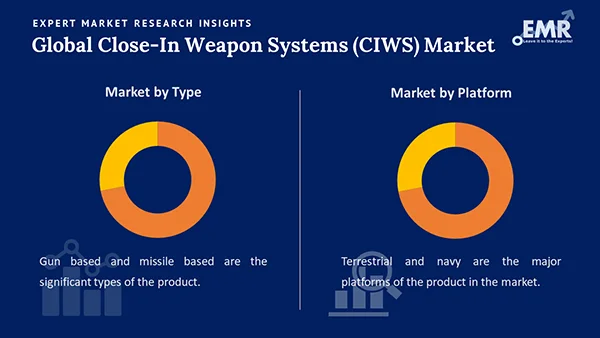
Consumer Insights
Uncover trends and behaviors shaping consumer choices today
Procurement Insights
Optimize your sourcing strategy with key market data
Industry Stats
Stay ahead with the latest trends and market analysis.
Trending Now



The close-in weapon systems (CIWS) market reached a value of nearly USD 8.41 Billion in 2024. The market is assessed to grow at a CAGR of 11.70% during the forecast period of 2025-2034 to attain a value of around USD 25.43 Billion by 2034. The market is being driven by the growing investments in the defence sector by governments, technological advancements and innovations, growing maritime threats, integration of CIWS with other advanced technologies, rising demand for modular and retrofittable systems, and the development of multifunctional CIWS.
Base Year
Historical Year
Forecast Year






Value in USD Billion
2025-2034
Close-In Weapon Systems (CIWS) Market Outlook
*this image is indicative*
Growth in military expenditure of both developed and developing economies will positively enhance the growth in the close-in weapon systems market. The increasing military expenditure in various developed and developing economies, to protect the sovereignty of the nation by defending the country's borders from any outside aggression and enhance the military capabilities of the nation, is driving the global market for close-in weapon systems (CIWS). The growing risk of international conflicts will further propel the growth of the close-in weapon systems (CIWS) market.
With the increase in global maritime threats, several nations are increasing their investments in naval capabilities. Upgrades to the existing fleets and the fitting of new ships with Close-In Weapon Systems (CIWS) would improve their defense strategies. In fact, several nations, such as the United States, China, and Russia, have made significant investments in naval modernization efforts with an emphasis on integrating advanced weapon systems, such as CIWS, to combat threats from anti-ship missiles and aerial attacks.
A number of countries, including the United States, China, and several European nations, are now embarking on programmes to modernize their naval forces in order to improve maritime security. As part of this process, it involves equipping the existing vessels with advanced Close-In Weapon Systems (CIWS) and installing such systems into the new ship designs. These programs work to enhance naval assets' toughness in contested waters by arming them with successful close-range protection capabilities, increasing the opportunities presented by the market for close-in weapon systems.
Notably, each of the aforementioned countries is actively upgrading its fleets to include new-generation CIWS as part of its overall programmes to enhance and upgrade its current defence capabilities. The Royal Netherlands Navy improved the Goalkeeper Close-In Weapon Systems, which passed sea acceptance tests recently aboard HNLMS Johan de Witt.
It will equip an upgraded CIWS that equips more state-of-the-art radar and electro-optic capabilities that enable better protection against most current and up-to-date menaces in such kind, especially the use of drones and supersonic missiles. The Goalkeeper CIWS is a crucial last line of defence for Dutch Navy vessels, ensuring they are equipped to address both current and future challenges in high-risk situations.
Integration of CIWS with other advanced defence technologies; growing integration of advanced technology in CIWS; rising demand for modular and retrofittable systems; and the development of multifunctional CIWS are favouring the close-in weapon systems (CIWS) market expansion.
The close-in weapon systems (CIWS) market landscape is revolutionised by the integration of CIWS with advanced defence technologies, such as radar systems, directed energy weapons, battle management systems, and AI-driven targeting. This kind of integration helps in the real-time tracking of incoming threats such as drones, missiles, and rockets and thus supports CIWS in engaging the targets more effectively and efficiently. With modern forces increasingly adopting networked defence concepts, the addition of CIWS in command and control (C2) systems as well as BMS to make coordination across the platforms more efficient is on the rise. Important players are now also integrating classic CIWS with DEWs, thereby increasing their effectiveness and flexibility in countering a broader set of threats as well as better protection against developing and diverse threats.
Close-in weapon systems (CIWS) easily integrate high-energy laser technologies and AI-powered tracking capabilities. Such advancements enable CIWS to respond to fast-moving threats, like drones and hypersonic missiles, with greater precision. For example, Raytheon's Phalanx system was upgraded with the integration of advanced radar and infrared tracking technologies relying on AI algorithms. This helps the system identify, recognize, and track several fast-moving threats at once. Its response time and accuracy improve drastically and thus contributes to the close-in weapon systems (CIWS) market growth. Countries like China and the United States are more advanced in their development of laser-based CIWS solutions to offer more conventional missile and gun systems as cost-effective, efficient point-defense solutions against the asymmetric threats. For example, China has planned to increase the defense budget for 2024 by 7.2 percent to about USD 222 billion. This defense budget is seen to be meant for further acceleration of the People's Liberation Army (PLA) modernisation in different segments, including deployment of CIWS.
Several countries are increasingly investing in modular Close-In Weapon System (CIWS) designs that can be easily integrated into a variety of platforms, including smaller ships and land-based systems. This advancement allows for the modernisation of current military assets by adding advanced CIWS capabilities, which extend the operational lifespan and enhance the readiness of older platforms, which can enhance the close-in weapon systems (CIWS) market value. For instance, the RAPIDFire system, which was developed through a partnership between Thales and Nexter, is a modular Close-In Weapon System (CIWS) designed for flexible installation on both naval vessels and ground platforms. It is used by the French Navy to address a variety of threats, including drones, missiles, and small boats. It is equipped with a 40mm CTA cannon and an automated ammunition management system and can be switched between both depending on the specific threat encountered. Retrofit programs are gaining popularity in many countries, including NATO allies, to ensure that their existing fleets are well-equipped to address modern threats without the need to build entirely new vessels.
The development of multifunctional CIWS with expanded utility beyond close-range defence is shaping the close-in weapon systems (CIWS) market trends and dynamics. Such systems lower the need for specialised and simple defence systems on a platform, which can be expensive in terms of maintenance and acquisition. Multifunctional CIWS supports innovations in defence categories and manufacturers are increasingly integrating radars, AI, advanced sensors, and directed energy systems (like lasers) into these systems. The increasing integration of multifunctional CIWS with multi-layered defence architectures to facilitate target sharing, real-time threat tracking, and enhanced coordination between different layers of defence is aiding the market. In the forecast period, the growing emphasis on continuous operation and reliability in complex defence environments is expected to increase the appeal of multifunctional CIWS.
The close-in weapon systems (CIWS) market is becoming increasingly advanced through the integration of technologies such as radar systems, AI-driven targeting, and directed energy weapons. These developments enhance the efficiency of CIWS in countering diverse threats, including drones, missiles, and rockets. The use of AI-powered tracking and laser technologies allows for improved precision and response times, while modular and retrofittable systems enable older platforms to be upgraded. Multifunctional CIWS, integrating radars, sensors, and directed energy systems, add up increased utility and multi-layered defense system integration. Furthermore, cost-effective, highly adaptable systems like RAPIDFire, and military rising budgets as in China grew 7.2%, propel the momentum of the close-in weapon systems market.
The increasing instances of agile small-scale threats posed by hostile entities with unmanned aerial vehicles and other high-speed craft have increased demands for close-in weapon systems designed to respond almost instantaneously.
Increasingly utilised for purposes of surveillance or attacks, unmaned aircraft, CIWS that are so armed with guns or artillery along with advanced features in radar play a crucial countering role as well. This trend of CIWS market is especially high in regions where naval forces are vulnerable to unconventional warfare tactics, especially in the Middle East. The SeaRAM system is a derivative of the famous Phalanx, marrying the capabilities of rapid-firing with Rolling Airframe Missiles, enhancing the Close-In Weapon System (CIWS) in defense against more threats, including fast-moving boats and a wide range of unmanned aerial vehicles (UAVs). It is highly effective in littoral environments where naval forces regularly encounter smaller, more agile adversaries.
The sales of Close-In Weapon Systems (CIWS) might be restricted in some parts of the world due to export controls and regulations. For example, the export of Close-In Weapon Systems (CIWS) is strictly controlled under the International Traffic in Arms Regulations (ITAR) by the US, which may impede the growth of the demand for close-in weapons systems (CIWS).
Such control restricts the sales of such systems only to the trusted allies and regions wherein the risk that such systems might come into the hands of unauthorized persons or a country's adversaries is minimal. Integrating CIWS into naval or land-based platforms requires complex engineering to ensure optimal placement and performance. These systems must be adaptable to different environments and capable of functioning effectively under harsh conditions, such as at sea. In addition, there are many operational issues associated with CIWS such as automation and the heat energy dry mechanisms, which can lead to wear and tear, and fuel demand for regular maintenance and repair.

Read more about this report - REQUEST FREE SAMPLE COPY IN PDF
“Global Close-In Weapon Systems (CIWS) Market Report and Forecast 2025-2034” offers a detailed analysis of the market based on the following segments:
Based on type, the market is divided into:
On the basis of platform, the industry is segmented into:
The major regional markets include:
By Type Insights
Based on type, gun-based close-in weapon systems are held to a prominent share in the market. The reason for this is due to the rising demand for various types of gun-based CIWSs, including AK_630, Pantsir-M, DARDO, Goalkeeper CIWS, Kashtan CIWS, and Myriad CIWS, among others. The Kashtan CIWS is likely to find its place in the forecast period due to its high ammunition storage and various other advantages, including its ability to protect ships against ASMs, anti-radar missiles, and aerial threats from the aircraft, among others, which can enhance close-in weapon systems (CIWS) industry revenue. It can also engage smaller vessels and ground targets. Meanwhile, missile-based CIWS are expected to offer growth to the market on account of cheap alternatives being developed for the costly missile-based CIWS. The 9M337 Sosna-R, for example is an effective but cheaper alternative to the tor missile system and Pantsir-S1.
By Platform Insights
The navy sector has the largest market share in close-in weapon systems because of the rising deployment of Close-In Weapon Systems on naval ships, which is crucial for offering advanced defensive capabilities against missiles, drones, and other aerial threats in high-pressure maritime settings. Naval forces around the world, including those in the United States, Europe, and Asia, have been investing heavily in CIWS technology to improve the resilience of their fleets.
Naval CIWS systems, among which are listed the Phalanx and SeaRAM, prove to be significantly important in close-in intercept/neutralization, as they allow for the approach of threats coming at close distance. These naval CIWSs are designed based on the necessity of rapid action in maritime defense.
Terrestrial CIWS, installed on military bases, land vehicles, or ground installations, are used to protect command centers, critical infrastructure, and high-value assets. The increasing threat of drone warfare, artillery bombardment, and missile attacks is driving the growth of the segment.
North America Close-In Weapon Systems (CIWS) Market Growth
North America accounts for a significant share of the market and is anticipated to remain a major market in the forecast period as well. This can be attributed to the increasing military expenditure of the US, along with the growing research and development activities in the nation, owing to the rising challenges faced by it due to terrorism, which can enhance the growth of the close-in weapon systems (CIWS) industry.
For instance, the US Department of Defense proposed a defence budget of USD 842 billion for 2024, focusing on technological advancements, and countering China's growing influence. Some of their major initiatives include the Pacific Deterrence Initiative, which was expected to see a 40% increase in funding, raising its total to USD 9.1 billion, aimed at strengthening the US military presence in the Indo-Pacific region.
Europe Close-In Weapon Systems (CIWS) Market Outlook
The regional market growth is driven by increased efforts by various government bodies to modernise the Navy. For instance, Italy is enhancing its naval capabilities with the Pattugliatore Polivalente d'Altura (PPA) program, which aims to equip modular offshore patrol vessels with advanced defensive systems. These vessels support various naval operations and play a crucial role in Italy's initiative to modernise its navy.
Asia Pacific Close-In Weapon Systems (CIWS) Market Trends
Russia and China are also likely to be significant markets for close-in weapon systems as these countries have witnessed a surge in spending on weapon systems. For instance, Russia enhanced its naval capabilities, through the innovation and implementation of systems such as the Kashtan Close-In Weapon System (CIWS), also known as Kortik, which is installed on several vessels of the Russian Navy.
Latin America Close-In Weapon Systems (CIWS) Market Analysis
Countries such as Brazil and Mexico are readily improving their defence capabilities to address regional security issues. These countries are modernising their naval forces by integrating Close-In Weapon Systems (CIWS) to protect coastal regions and vital maritime routes. For instance, Brazil is making efforts to improve its naval defences as part of a strategy to secure its significant offshore oil resources and boost close-in weapon systems (CIWS) market expansion. The Brazilian government allocated around USD 29.9 billion for the modernisation of its defence sector between 2024 and 2028, with a substantial focus on improving the capabilities of the Brazilian Navy.
Middle East and Africa Close-In Weapon Systems (CIWS) Market Drivers
Ongoing geopolitical tensions and long-standing regional conflicts are significantly increasing the demand for Close-In Weapon Systems (CIWS). Countries in these areas are focusing on strengthening their defence capabilities. In particular, Gulf nations such as Saudi Arabia and the United Arab Emirates are making substantial investments to modernise their naval fleets to address threats in major maritime routes, especially in the Persian Gulf, which can further increase demand of close-in weapon systems (CIWS) market.
Saudi Arabia launched the Saudi Naval Expansion Program II (SNEP II), which signifies a significant financial commitment to enhancing its naval capabilities. This initiative includes the acquisition of advanced, high-end vessels, such as the Avante 2200 corvettes manufactured by the Spanish shipbuilding firm Navantia.
Startups are playing a crucial role in advancing defence technology by focusing on advanced automation, incorporating AI and developing compact, flexible solutions for short-range defence. Some major startups are specialising in AI-driven autonomous systems that can be customised for various defence applications, including close-in weapon systems. These innovations aim to improve response times and accuracy through machine learning algorithms that improve target identification and tracking capabilities and positively impact the close-in weapon systems (CIWS) demand forecast.
Anduril Industries
Anduril, a U.S.-based startup, is making significant advancements in defence technology through its AI-driven autonomous systems, which can be customised for a range of defence purposes, including Close-In Weapon Systems (CIWS). The company focuses on the integration of machine learning to improve real-time target identification and tracking, thereby enhancing the speed and precision of responses in defence situations.
Fortem Technologies
Fortem Technologies is gaining prominence due to its counter-drone technology as well as innovation in areas that intersect with CIWS. The company’s DroneHunter system employs radar and AI to autonomously detect and neutralise aerial threats, such as unmanned aerial vehicles (UAVs) and other small flying objects. This system is particularly relevant for CIWS applications, especially in scenarios where rapid and accurate interception of short-range threats is essential.
Key close-in weapon systems (CIWS) market players are attempting to develop integrated Close-In Weapon Systems (CIWS) for naval and ground forces. They are also heavily invested in CIWS which combines advanced sensor technology with high firing rates, allowing for effective interception of threats from both sea and air. Additionally, close-in weapon systems (CIWS) companies are expanding their global footprint by partnering with allied nations in the Asia-Pacific and Middle East regions.
ASELSAN, based in Turkey, is a prominent player in the defence electronics sector. The company specialises in advanced technology systems for military and civilian applications. Founded in 1975, ASELSAN designs and manufactures a wide range of products, including communication systems, radar systems, electro-optical systems, and unmanned systems.
BAE Systems, headquartered in the United Kingdom, is one of the largest defence, aerospace, and security companies in the world. With a presence in over 40 countries, BAE Systems focuses on developing high-end military equipment, such as submarines, combat vehicles, electronic systems, and munitions, among others.
General Dynamics is an American defence company, founded in 1952, which operates across various sectors such as aerospace, combat systems, marine systems, and information technology, among others.
Raytheon Technologies Corporation, headquartered in Virginia, United States, and founded in 1922, is a prominent player in the defence and commercial aircraft sectors. With over 185,000 employees across the world, the company’s leading businesses include Pratt & Whitney, Collins Aerospace, and Raytheon.
*Please note that this is only a partial list; the complete list of key players is available in the full report. Additionally, the list of key players can be customized to better suit your needs.*
Other major players in the close-in weapon systems (CIWS) market are Lockheed Martin Corporation, among others.
*While we strive to always give you current and accurate information, the numbers depicted on the website are indicative and may differ from the actual numbers in the main report. At Expert Market Research, we aim to bring you the latest insights and trends in the market. Using our analyses and forecasts, stakeholders can understand the market dynamics, navigate challenges, and capitalize on opportunities to make data-driven strategic decisions.*
Get in touch with us for a customized solution tailored to your unique requirements and save upto 35%!
In 2024, the market reached an approximate value of USD 8.41 Billion.
The market is projected to grow at a CAGR of 11.70% between 2025 and 2034.
The market is estimated to witness healthy growth in the forecast period of 2025-2034 to reach a value of around USD 25.43 Billion by 2034.
The major drivers of the market include the rising military expenditure in both developed and developing countries in order to protect national sovereignty, increasing threat of aerial attacks, and the growing risk of international conflicts.
The key trends guiding the growth of the market include technological advancements in missile defence technology in order to eradicate the aerial or water threats and the development of low cost missile-based CIWS alternatives.
The major regions in the market are North America, Latin America, the Middle East and Africa, Europe, and the Asia Pacific.
Gun based and missile based are the significant types of close-in weapon systems.
Terrestrial and navy are the major platforms of close-in weapon systems in the market.
The key players in the global close-in weapon systems market are ASELSAN A.S., BAE Systems, General Dynamics Corporation, Lockheed Martin Corporation, and Raytheon Technologies Corporation, among others.
Explore our key highlights of the report and gain a concise overview of key findings, trends, and actionable insights that will empower your strategic decisions.
| REPORT FEATURES | DETAILS |
| Base Year | 2024 |
| Historical Period | 2018-2024 |
| Forecast Period | 2025-2034 |
| Scope of the Report |
Historical and Forecast Trends, Industry Drivers and Constraints, Historical and Forecast Market Analysis by Segment:
|
| Breakup by Type |
|
| Breakup by Platform |
|
| Breakup by Region |
|
| Market Dynamics |
|
| Competitive Landscape |
|
| Companies Covered |
|
| Report Price and Purchase Option | Explore our purchase options that are best suited to your resources and industry needs. |
| Delivery Format | Delivered as an attached PDF and Excel through email, with an option of receiving an editable PPT, according to the purchase option. |
Datasheet
One User
USD 2,499
USD 2,249
tax inclusive*
Single User License
One User
USD 3,999
USD 3,599
tax inclusive*
Five User License
Five User
USD 4,999
USD 4,249
tax inclusive*
Corporate License
Unlimited Users
USD 5,999
USD 5,099
tax inclusive*
*Please note that the prices mentioned below are starting prices for each bundle type. Kindly contact our team for further details.*
Flash Bundle
Small Business Bundle
Growth Bundle
Enterprise Bundle
*Please note that the prices mentioned below are starting prices for each bundle type. Kindly contact our team for further details.*
Flash Bundle
Number of Reports: 3
20%
tax inclusive*
Small Business Bundle
Number of Reports: 5
25%
tax inclusive*
Growth Bundle
Number of Reports: 8
30%
tax inclusive*
Enterprise Bundle
Number of Reports: 10
35%
tax inclusive*
How To Order
Our step-by-step guide will help you select, purchase, and access your reports swiftly, ensuring you get the information that drives your decisions, right when you need it.

Select License Type
Choose the right license for your needs and access rights.

Click on ‘Buy Now’
Add the report to your cart with one click and proceed to register.

Select Mode of Payment
Choose a payment option for a secure checkout. You will be redirected accordingly.
Gain insights to stay ahead and seize opportunities.

Get insights & trends for a competitive edge.

Track prices with detailed trend reports.

Analyse trade data for supply chain insights.

Leverage cost reports for smart savings

Enhance supply chain with partnerships.

Connect For More Information
Our expert team of analysts will offer full support and resolve any queries regarding the report, before and after the purchase.
Our expert team of analysts will offer full support and resolve any queries regarding the report, before and after the purchase.
We employ meticulous research methods, blending advanced analytics and expert insights to deliver accurate, actionable industry intelligence, staying ahead of competitors.
Our skilled analysts offer unparalleled competitive advantage with detailed insights on current and emerging markets, ensuring your strategic edge.
We offer an in-depth yet simplified presentation of industry insights and analysis to meet your specific requirements effectively.



Australia
63 Fiona Drive, Tamworth, NSW
+61-448-061-727
India
C130 Sector 2 Noida, Uttar Pradesh 201301
+91-723-689-1189
Philippines
40th Floor, PBCom Tower, 6795 Ayala Avenue Cor V.A Rufino St. Makati City,1226.
+63-287-899-028, +63-967-048-3306
United Kingdom
6 Gardner Place, Becketts Close, Feltham TW14 0BX, Greater London
+44-753-713-2163
United States
30 North Gould Street, Sheridan, WY 82801
+1-415-325-5166
Vietnam
193/26/4 St.no.6, Ward Binh Hung Hoa, Binh Tan District, Ho Chi Minh City
+84-865-399-124
United States (Head Office)
30 North Gould Street, Sheridan, WY 82801
+1-415-325-5166
Australia
63 Fiona Drive, Tamworth, NSW
+61-448-061-727
India
C130 Sector 2 Noida, Uttar Pradesh 201301
+91-723-689-1189
Philippines
40th Floor, PBCom Tower, 6795 Ayala Avenue Cor V.A Rufino St. Makati City, 1226.
+63-287-899-028, +63-967-048-3306
United Kingdom
6 Gardner Place, Becketts Close, Feltham TW14 0BX, Greater London
+44-753-713-2163
Vietnam
193/26/4 St.no.6, Ward Binh Hung Hoa, Binh Tan District, Ho Chi Minh City
+84-865-399-124
Share